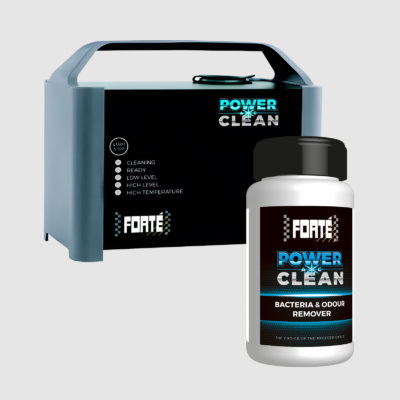Forté Technical tips – Breathing Bacteria
Air Conditioning (A/C) or Climate Control is now commonplace and fitted as standard in most vehicles. A/C systems work independently of the heating system and are used purely to chill ambient temperature air, which vents into the passenger cabin. With the advances in electronic control and management, Climate Control systems can regulate and maintain temperatures, ranging from around 16 to 32 degrees Celsius, as selected on the dashboard-mounted heating and ventilation controls.
To ensure optimum performance of the systems and be able to control cabin temperatures for passenger comfort all year round, the A/C and Climate Control systems should be used continuously. Vehicle manufacturers recommend that if the system is not constantly used, it should be run briefly on a cold setting at least once a week.
Problems can arise if the system is not run for extended periods, particularly during winter months. During this time, when cold, damp conditions exist, condensation builds up on the evaporator (a heat exchanger that chills ambient temperature air situated in the ventilation ducting), which becomes an ideal breeding ground for mould and fungi. As this mould and fungi grow, bacterial spores are formed, which can have harmful effects on vehicle passengers.
During the summer months, when the A/C is used, bad-smelling odours produced by the bacteria are vented into the passenger cabin. This results in poor air quality and an unpleasant driving experience. A condition known as ‘sick car syndrome’ can also be experienced as the bacterial spores released from the mould and fungi, when breathed in, can cause flu-like symptoms to those with sensitive respiratory conditions.
Under normal conditions, excess condensation runs off from the evaporator and drains from the vehicle via a drain tube. Water collects in the bottom of the ducting if the tube becomes blocked. This pooled water becomes stagnant through the growth of bacterial mould and fungi.
It is, therefore, essential that A/C and Climate Control systems are used appropriately. If not, problems can occur that need to be addressed with chemical cleaners to remove mould and fungi growth from the evaporator and kill any bacteria that can have health implications. Likewise, if the ducting drain tube is blocked, it must be cleared to prevent water collecting.
Forté’s Solution:
Power-Clean AC uses the latest technology to safely and effectively remove bacteria, mould and fungi within the air conditioning system. A fine vapour also removes and sanitises all surface bacteria from the vehicle’s cabin. It is recommended to perform a Power Clean AC treatment every time the vehicle is presented for a routine service.

